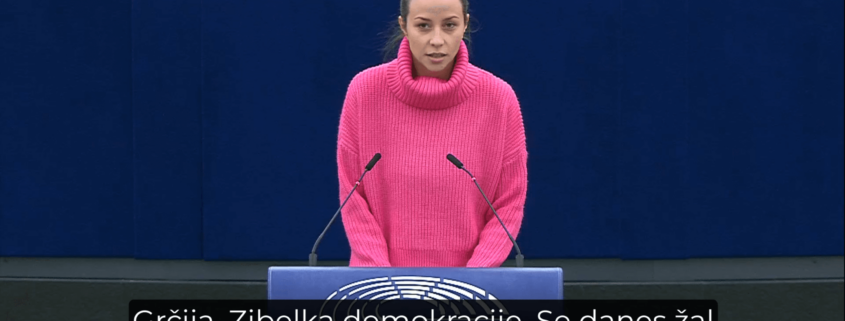On Wednesday, 17 January 2024, MEP Irena Joveva (Freedom/Renew) took part in the debate on the rule of law and media freedom in Greece at the plenary session in Strasbourg. In her introduction, the MEP recalled that Greece is historically known as the cradle of democracy, but today, unfortunately, the country is “in a completely different light”.
As she pointed out, media freedom in Greece is strongly influenced by deep-rooted systemic obstacles, which stem, among other things, from the lack of media pluralism and the oligarchic ownership structure of media houses that dictate the editorial policy of the media, which consequently also leads to self-censorship:
“The murder of journalist Giorgos Karaivaz remains unsolved. Journalists are facing numerous legal proceedings. Unfounded. In order to silence them.”
According to Joveva, all of the above creates obstacles to independent and critical reporting. The MEP is concerned that at a time when the European level is setting standards for resolving situations such as those in Greece through the Media Freedom Act, the Greek government is proposing a law that would increase prison sentences for journalists.
“That is why we must not remain silent. We must monitor the implementation of European media legislation in Greece. We must fight to ensure that the cradle of democracy does not also become its graveyard,” she concluded.
The resolution on the state of the rule of law and media freedom in Greece is expected to be approved by MEPs at the first plenary session in February.
You can watch the full video here.
BACKGROUND
The past few years have seen a marked deterioration in media freedom in Greece, which has led the Mediterranean country to fall to the bottom of the European Union’s press freedom rankings. This worrying situation, which coincides with the rise to power of the centre-right New Democracy party, has also raised alarms in Brussels. The country was rocked in recent years by the murder of Giorgos Karaivaz, an investigative journalist who reported on links between the Greek criminal underworld and allegedly corrupt police officers.
While Karaivaz’s murder was the most glaring example of the deterioration in the safety of journalists, the media freedom situation has also deteriorated due to a lack of media pluralism, political interference in the independence of the media and the concentration of media ownership in the hands of wealthy oligarchs. This trend poses a serious threat not only to media freedom in Greece, but is also a cause for concern at European level.




Leave a Reply
Want to join the discussion?Feel free to contribute!